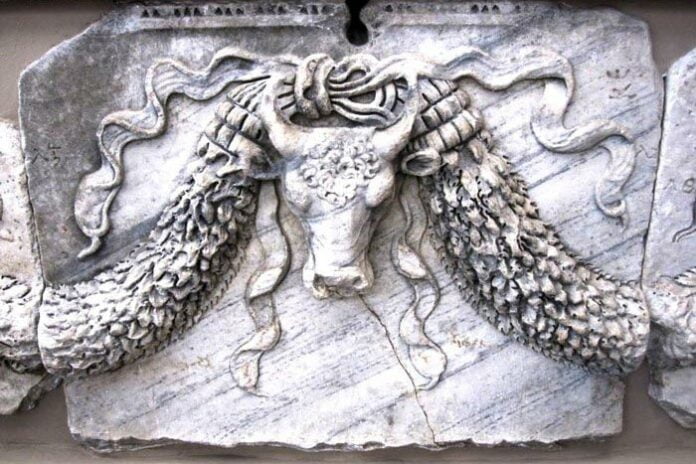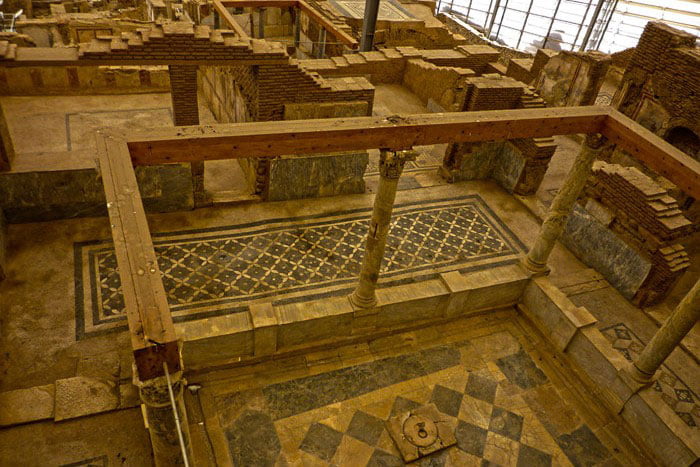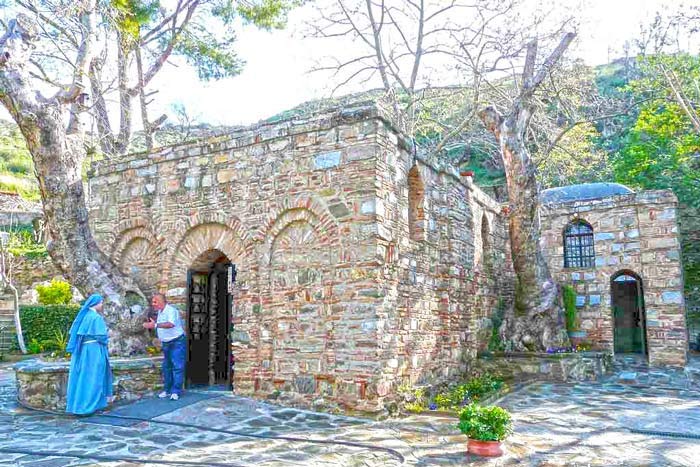Guided tour Ephesus – According legend, Ephesus was founded by the tribe of the Amazons, great female warriors. The name of the city is thought to have been derived from “Apasas”, the name of a city in the “Kingdom of Arzawa” meaning the “city of the Mother Goddess” and some scholars maintain that the sign of the labrys, the double-axe of the mother goddess which adorned the palace at Knossos, Crete, originated in Ephesus. Ephesus was inhabited from the end of the Bronze Age onwards, but the location was changed owing to floods and the whims of various rulers. While Carians and Lelegians were among the city’s first inhabitants, Ionian migrations began around 1200 BCE and Ephesus is chiefly known as a Ionian Greek city.
Guided tour Ephesus Greek Ephesus
The city was founded for the second time by the Ionian Androclus, son of Codrus, and the cities that were established after the Ionian migrations joined in a confederacy under the leadership of the city of Ephesus. The region was devastated during the Cimmerian invasion at the beginning of the 7th century BCE but, under the rule of the Lydian kings, Ephesus became one of the wealthiest cities in the Mediterranean world. Ephesus was a center of learning and the birthplace and home of the great Pre-Socratic philosopher Heraclitus.
Women enjoyed rights and privileges equal to men and there are records of female artists, sculptors, painters and teachers. At night the streets of the city were brightly lit with oil lamps, a luxury not many cities could afford. Under the rule of King Croesus of Lydia, construction of the great Temple of Artemis at Ephesus was begun; one of the Seven Wonders of the Ancient World (destroyed, the first time; by fire in 356 BCE, the same night Alexander the Great was born). The defeat of Croesus by Cyrus, the King of Persia, brought the whole of Anatolia under Persian rule but Ephesus continued to prosper as an important port of trade. When the Ionian city-states rebelled against Persian rule in the 5th century BC; Ephesus remained neutral and thus escaped the destruction suffered by so many other cities at the hands of the Persians.
Guided tour Ephesus – Hellenistic Ephesus
Ephesus remained under Persian rule until liberated by Alexander the Great in 334 BCE. Upon entering Ephesus, and seeing the reconstruction of the Temple of Artemis not yet complete, Alexander offered to rebuild it. The Ephesians, however, refused his offer, claiming it was not seemly for one god to build a temple to another. Lysimachus, one of the generals of Alexander who became ruler of the region after Alexander’s death; began renewal and development of the city, which he called Arsineia after his wife Arsinoe.
He constructed a new harbor, built defensive walls on the slopes of the Panayir and Bülbül mountains and moved the city approximately two miles south-west. The Ephesians, however; refused to leave their homes and the traditional site of their city so Lysimachus had the city’s sewage system blocked up during a great storm; thus rendering the houses uninhabitable and forcing the citizens to move. In 281 BCE the city was re-founded under the old name of Ephesus and; again, was known as one of the most important commercial ports in the Mediterranean.
Guided tour Ephesus – Roman Ephesus
In 129 BCE the Roman Empire acquired Ephesus according to the will left by Attalos, King of Pergamon; by which they were bequeathed his kingdom. During this time, the heavy taxes imposed by the Roman government led to the rebellion of Mithridates and; in 88 BCE, a massacre of all the Latin speaking inhabitants of the city was carried out during the storming and sack of Ephesus by the Roman army under Sulla. The city suffered severe damage in an earthquake in 17 CE. After that Ephesus became once more a very important center of trade and commerce. The historian Aristio, and others; describe Ephesus as being recognized by all the inhabitants of the region as the most important trading center in Asia. It also remained a leading political and intellectual center; boasting the impressive Celsus Library and the second school of philosophy in the Aegean Guided tour Ephesus.
From the 1st century CE onwards, Ephesus was visited repeatedly by early Christians (most notably Saint Paul; who preached and was ‘booed’ in the theater there); and Mary, the mother of Jesus; is said to have retired there along with Saint John (John’s tomb and Mary’s house may still be visited today). The Biblical Book of Ephesians is an epistle written by Paul to the Christian community at Ephesus. The city that became famous in later times, for the Cave of the Seven Sleepers; who were reputed to be seven Christian saints who were walled up in a cave above Ephesus for their faith in ‘pagan times’; slept for two hundred years; and emerged after Christianity had come to power, thus proving the ‘truth’ of the faith in the resurrection of the body.
Guided tour Ephesus – Christianity
After Christianity became the dominant religion of the region, Ephesus declined in culture and intellectual pursuits. The Emperor Theodosius had all of the Temples and schools closed and women were reduced to second-class citizen status; no longer allowed to teach men or work independently in the arts. Worship of the ancient mother goddess Artemis was forbidden and the Temple of Artemis was destroyed by a Christian mob; the ruins used as a quarry for building materials for other local projects such as churches. The streets, once adorned with statuary, highly maintained and lighted by the oil lamps at night; fell into decay and darkness as the attention of the now-Christian citizens of Ephesus was directed toward the Second Coming of The Light of the World, the new god Jesus Christ.








